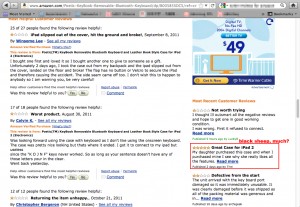Information Cascades: The Negative Side of Positive Reviews
Just over a month ago, the Cornell Daily Sun posted an article on Cornell researchers’ findings regarding fake online reviews. The reporter mentioned at the end of the article that “many companies have approached the researchers to get access to their algorithm to make their online reviews more trustworthy”. The question is, why do companies like Amazon.com, TripAdvisor, and Yelp care about fake reviews?
According to an article by the New York Times, which references these Cornell researchers’ findings, private companies are ever-demanding for better customer reviews. As a result of this demand, many have hired reviewers who would write positive reviews on sites like Amazon for monetary profit. The idea here is that 1) the better rated a product or service (ex. Hotel), the higher up it will show on search results on a website like Amazon or TripAdvisor, and 2) the better rated a product or service, the more likely people will follow suit and purchase those products or services.
The second point I mentioned above relates to the idea of information cascades. As I have noted, companies hope that with better reviews, potential customers will look to those reviews and make their judgment of whether or not to buy a product based on the judgments of previous purchasers (i.e. reviewers). The more positive a product’s reviews, the better that product looks in a customer’s eyes, and the more likely the customer will buy the product (or service, or anything that might base part of its advertising on online reviews).
As we have seen in class, information cascades are part of an individual’s rational decision-making process. By looking at what previous individuals have chosen, a customer can infer signals from their decisions, and hence use that information to help maker his/her decision on whether to buy the item. This is a good judgment system when all the reviews are true and independent, providing various sources of information to the potential consumer. This is not a great system, however, when there are fake reviews that skew the information distribution to the positive side and hence falsely prompts a customer to purchase the product.
You might be wondering, wouldn’t the cascade fall apart once a negative review rolls in? The answer is: it depends. Take a look at this Amazon.com listing for an iPad keyboard. There are a total of 59 ratings, and the average of all the ratings is 3.5 stars. After flipping through the reviews, I noticed a pattern: there are numerous users condemning the keyboard case for failing to hold the iPad in place (and hence, letting it drop on the floor), and there are also numerous 5-star too-positive-to-be-true reviews by users who have posted only one review on Amazon.com. Obviously, the users who had their iPads drop on the floor submitted negative reviews led the overall rating to drop, but the suspiciously positive reviews allowed the rating to still be relatively high. Even though the negative reviews could potentially break the cascade, the number of positive reviews overshadowed their effects.

Some reviews just seem unnaturally... optimistic? The difficulty of tracking fake online reviews is that they are just so difficult to distinguish from real ones... and that is where the Cornell researchers' findings come in.
The Cornell researchers who published their study on fake online reviews stated that humans are incredibly bad at distinguishing true reviews from fake reviews. Professor Hancock mentioned that when detecting deception, humans perform only at chance level (Cornell Sun article). With only 50% accuracy in determining the truthfulness of reviews, it is no wonder that Amazon.com and similar companies are anxious to find a way to detect fake reviews – the wrong products may be selling because of deceptive advertising.
In summary, fake reviews are very dangerous to consumers in that they provide false information that influences the information cascade effect. Potential consumers look at previous reviews in order to judge the potential reliability of the product. With untruthful reporting, these potential consumers are misled, and may end up with an unsatisfactory experience. Because of the human fallibility to deception, fake reviews have become a rising problem among Internet sites relying on customer feedback (such as Yelp and travel sites). These sites, then, must implement better tactics to spot fake reviews in order to become more responsible to the consumers using their services.
Just for your personal shopping reference, check out this page by the New York Times on characteristics of a fake online review just in case you might run into one during a shopping trip at Amazon.com.
